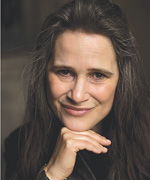Martha Feldman, Professor in Music and the College
By Phil Rockrohr
 Martha Feldman |
|
Two key concepts guide Martha Feldman’s approach to teaching graduate students. The first is that everyone in the classroom, including Feldman, Acting Chair and Professor in Music and the College, is a student.
“The classroom does not work well if everyone is not learning,” Feldman said. “For me, that means there can’t be preordained answers to big questions. When the material as mysterious, unyielding, recalcitrant, even disconcerting to everyone, we start to get important insights.”
The second concept—order emerges by allowing a certain amount of chaos—is less common than the first. By chaos, Feldman means that simple snapshots of music history do not a priori exist.
“Although my specialization is music, I wrestle with history and culture,” she said, “and in those arenas, every time you press on an issue, you see that the terrain is very disorderly. It’s simply not the condition of history, culture, human society or even most musical events to be neat and tidy.
“Therefore, my style of teaching presumes that if you start with too much system, you can’t generate interesting ideas,” Feldman said. “The gauntlet I throw down to students is: ‘How are we going to make something cogent out of this mess of stuff?’”
That approach is challenging for many students, Feldman said. “I sympathize, but I do believe this approach is what keeps my classes fresh and dynamic. The students who rise out of the muck come out very strong-minded, independent and well-formed.”
For Feldman, the “fundamental challenge” of graduate-level work is accepting the disorder as a prerequisite. “Teaching students how to deal with that, how to accept it as a condition of moving forward, is essential to the project of scholarship,” she said. “So in teaching graduate students, I take that as a first order of business.”
Feldman, an acclaimed scholar who received a 2006 John Simon Guggenheim Memorial Foundation fellowship and the 2001 Dent Medal from the Royal Musical Association (the highest honor bestowed upon a musicologist), and who gave the prestigious 2007 Ernest Bloch Lectures at the University of California, Berkeley, becomes “enormously absorbed” in the work of her graduate students, involving herself in everything from seminar papers and dissertations to grant proposals and article submissions.
Nonetheless, Feldman was surprised to be selected for a Graduate Teaching Award because she feels so many of her Chicago colleagues share her level of involvement. “At Chicago, to be powerfully engaged with students is the norm. I am personally very, very honored, amazed and thrilled that my graduate students have singled me out for this distinction. But, in general, I think it’s also due to the Chicago ethic.”
![[Chronicle]](/images/sidebar_header_oct06.gif)